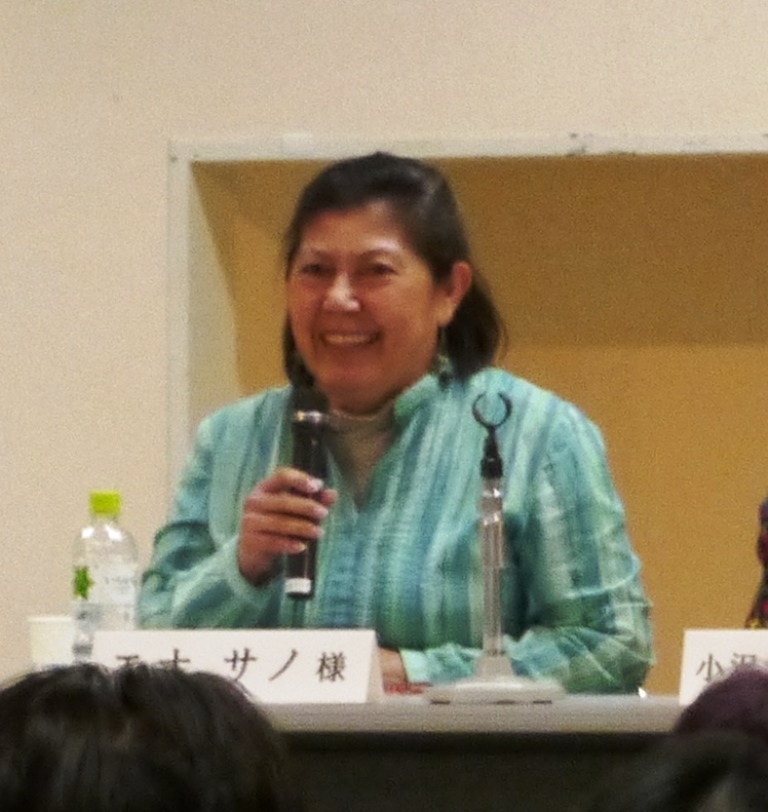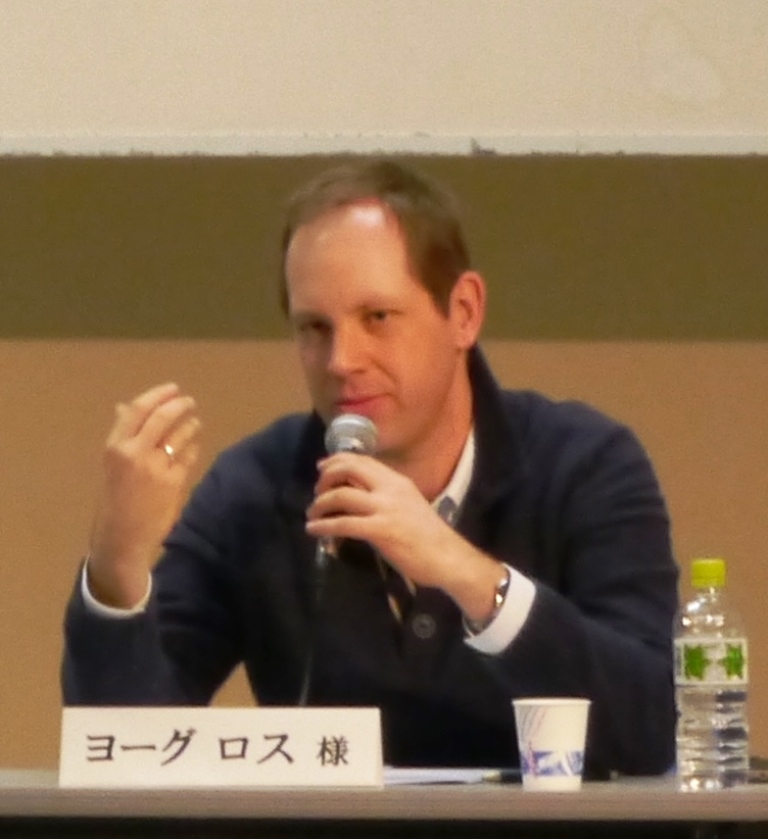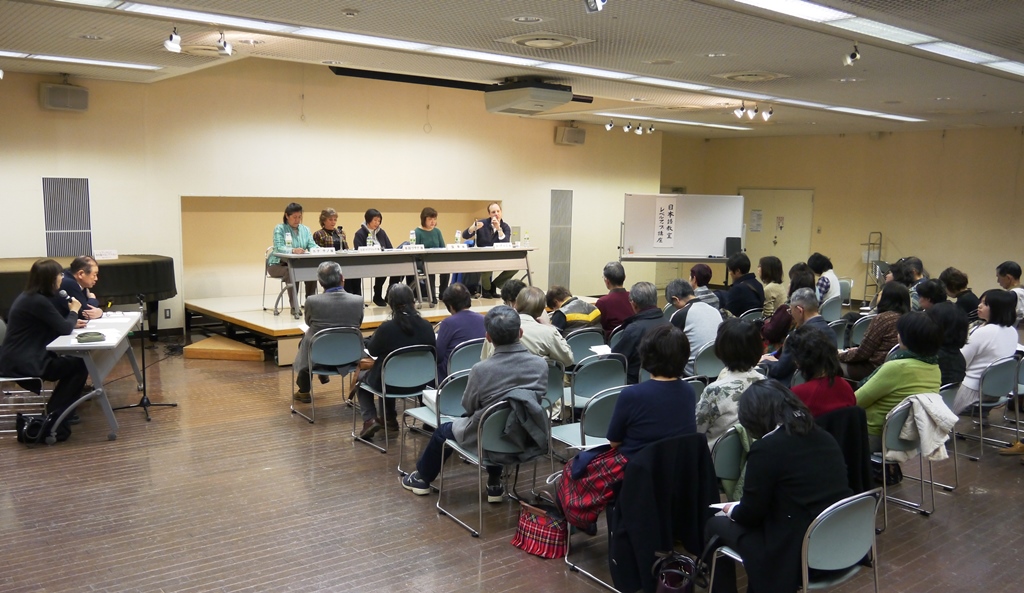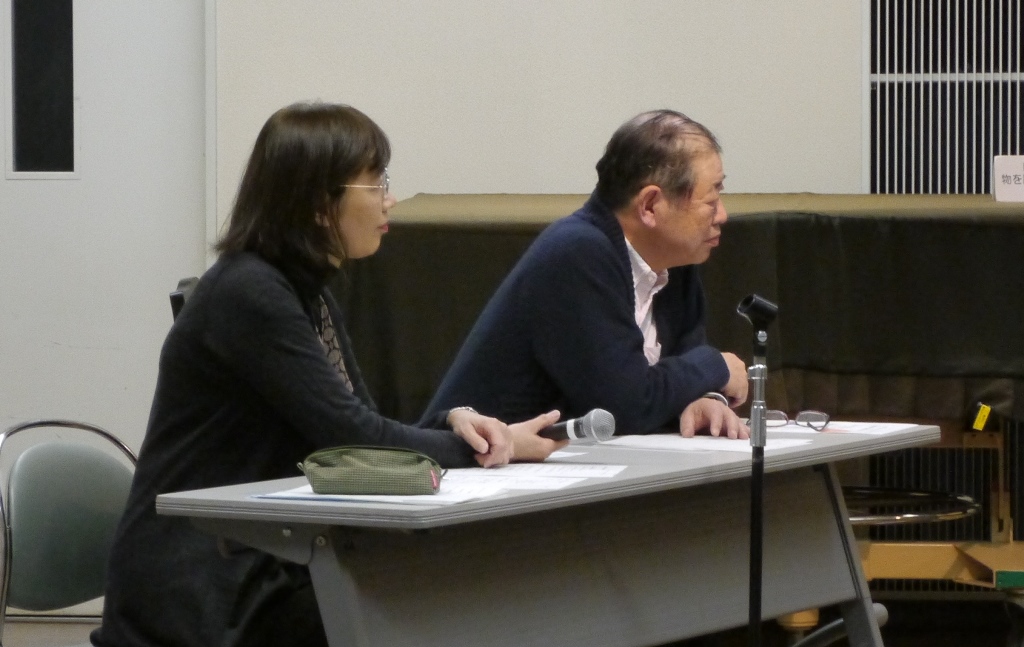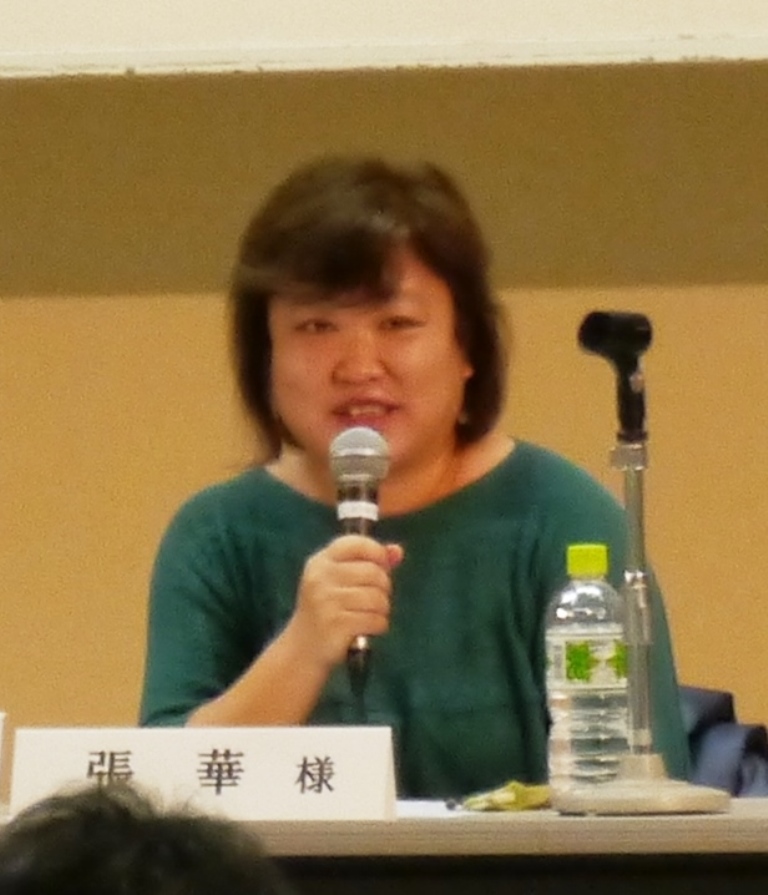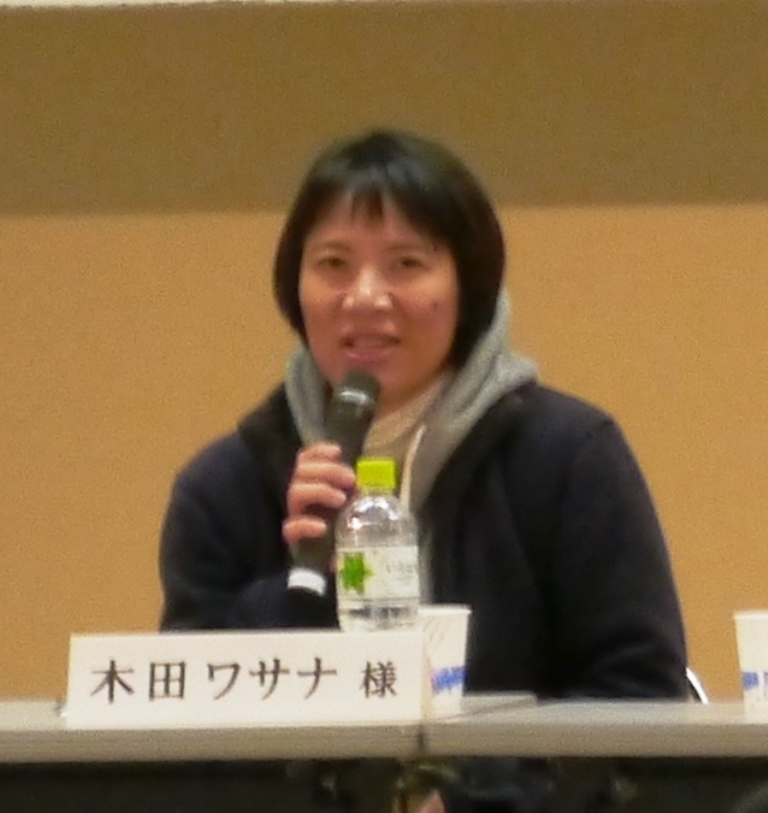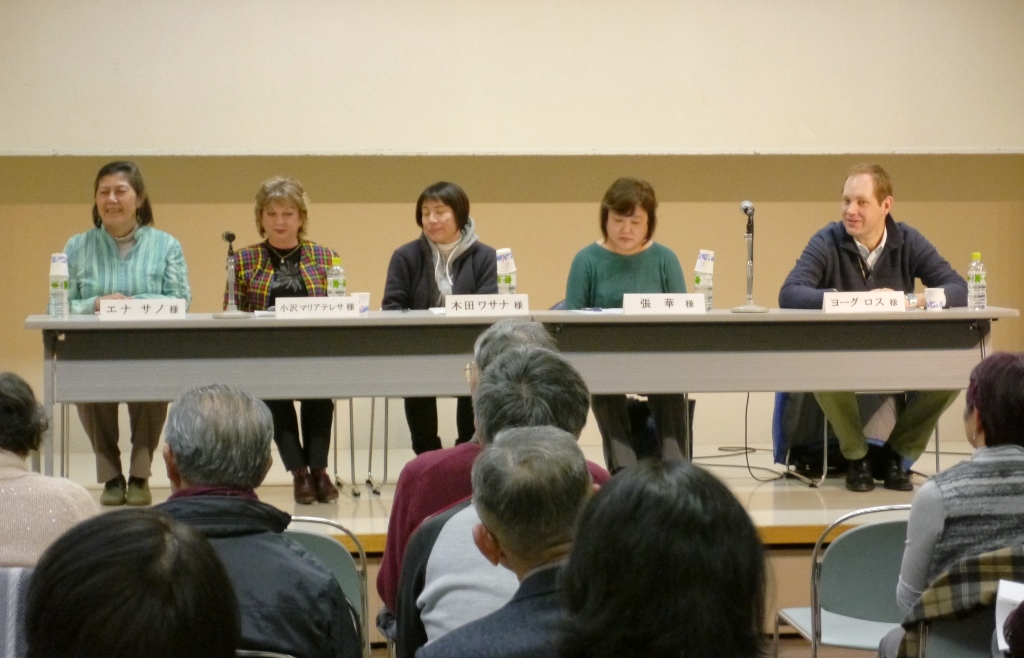
Venue: Grand Hall, Abiko Civic Plaza
Guest Panelists: Ms. Ena Sano (El Salvador), Ms. Maria Theresa Ozawa (Columbia), Ms. Wasana Kida(Thailand), Ms. Zhan Hua,(張華 China), Mr. Joerg Roth(Germany)
Participants: Mr. Hesaki, chief of AIRA Volunteer Activity Dep., volunteer teachers and students of AIRA Japanese Language Course and others. 42 people in total (including 8 foreigners).
AIRA has Japanese language classes on Tuesday morning, Friday evening and Saturday morning. Volunteer teachers teach foreigners from the basic to intermediate level of Japanese in those classes.
On this day teachers held “Panel Discussion for Better Japanese Teaching” to seek for more effective teaching ways that meet foreigners’ needs.
Five foreign-born people including former students at AIRA Japanese Course and residents of Abiko were invited to the symposium as guest panelists. They told how they learned Japanese language and how they use it in their work and daily life.
The panel discussion was emceed by two teachers of the Saturday class, Mr. Obara and Ms. Yamada. Following Mr. Hesaki’s opening speech, they asked various questions which had been prepared by hearing voices from teachers and students beforehand, and the guests answered those questions one after another.
First of all, each panelist introduced themselves. All of them have different backgrounds— reasons and purposes of coming to Japan, lifestyles and surroundings in Japan. Except for one panelist who has been in Japan about three and a half years, the other four have lived in Japan from seventeen to thirty-nine years and they speak Japanese quite fluently. But the days when they first came to Japan was a hard time for them because they didn’t understand Japanese at all. They learned Japanese in different ways. The following is the questions and answers in the discussion.
About Japanese Learning
Q1. How did you study Japanese?
- When I first came to Japan, there were no Japanese classes, so I learned Japanese watching TV.
- My husband wrote phrases in my notebook for me and I learned them.
- I wrote down new words and looked them up in the dictionary.
- I learned at a Japanese language school and AIRA Japanese Course.
Q2. What was efficient for your Japanese learning?
- In AIRA classes, I had a lot of opportunities to speak Japanese because we studied in small groups.
- Spoken Japanese and written Japanese (textbook Japanese) are different. So I tried to make friends and speak with people around me and asked them to correct my mistakes.
- I focused on practicing pronunciation.
Q3. What were the most difficult aspects in learning Japanese? (e.g. hirgana/katakana/kanji, pronunciation, grammar, conversations, etc.)
- It was Kanji (Chinese characters). I have a bitter experience of buying and eating dogfood because I couldn’t read kanji.
- I couldn’t use conjunctions properly, which sometimes led me to misunderstandings.
- Onyomi
- Katakana words representing foreign words are difficult. Whether a word should be with or without a hyphen, which expresses a long vowel, is especially hard for me to distinguish.
Q4. What kinds of lessons were helpful for you?
- I tried to use new words and phrases in conversation as much as possible.
- I made and memorized sentences using words given by teachers.
- I read Japanese novels translated into my native language. I tried to read them in Japanese, which improved my Japanese very much.
Q-5. Were there any impressive lessons in AIRA Japanese Course?
- It was helpful that I was able to ask teachers about the life in Japan.
- I sold goods at a shop in the AIRA Festival. Our teachers were behind us, ready to help any time, so we were able to talk with customers without feeling nervous or uneasy. I got confidence in speaking Japanese through that experience.
- I learned practical Japanese through role-play practices.
- I was thankful to teachers for correcting my mistakes.
Q6. Do you have any advices for those who are going to start learning Japanese?
- It was helpful to read old stories for children written in hiragana and get used to Japanese expressions.
- Try to make the most of conversation with people around you. It’s the best chance to practice.
- Find your favorite writers. Reading them will help you improve your Japanese.
- Watch TV programs with subtitles.
- Have courage to speak to people in Japanese if you want to get fluent.
Experiences relating to Japanese language
Q1. Talk about your experiences when you felt pleased to help someone using your Japanese skill or you felt embarrassed or confused because you didn’t understand Japanese or misunderstood words or phrases.
[Pleasure]
- Now I’m good at Japanese and get money as an interpreter. I’m also a teacher of my native language.
- I help people as a volunteer.
- I watch TV shows of my favorite actors and singers, and I’m happy to hear their voices, not dubbed ones.
[Embarrassment and Confusion]
- I was giggled at when I was selling at a bazar and said, “Do you need ‘o-fukuro’ ?” (I meant to say “Do you need a plastic bag?) I had learned that people put “o” before a word to be polite in Japanese. But “o-fukuro” and “fukuro” are totally different words meaning “mother” and “bag”.
- I felt frustrated when I couldn’t properly explain my symptoms to the doctor at a clinic.
- Some words are very confusing to distinguish, e.g. “toraberu”(travel) and “toraburu”(trouble) which are written in katakana, “byoin”(hospital) and “biyouin”(beauty salon), “higaeri”(one-day, not overnight) and “higawari”(something that changes every day, like daily special in a restaurant menu).
- In a beauty salon I didn’t understand what the hairdresser was saying and had to pay additional charges.
- In Japanese sentences subjects are often omitted. When I hear “Modottekita” (Came back.), I wonder “WHO?”
- When you raise the pitch at the end of a sentence, it can mean an interrogative sentence without changing the form.
Q2. Are there any expressions in spoken Japanese you find difficult to catch or understand?
- Dialects of Kansai, Kyoto, etc.
- Differences of pronunciations between “yokka”(the fourth day) and “youka”(the eighth day). Differences of intonation of “hashi” (bridge or edge?), “hana”(nose or flower?), etc.
- I find it difficult to properly use postpositions such as “wo, ga, e, de, ni, etc.)
- Two different expressions that represent the same meaning, e.g. “nenrei” and “otoshi” (both mean age), “osumai” and “gojusho”(address), “moyorieki” and “chikaku no eki” (the nearest station), “kankei” and “aidagara” (people’s relations), etc.
- Japanese ambiguous expressions (People don’t say “Yes” or “No” clearly.). And honorific expressions are also difficult.
After these discussions, there were more questions and answers. The subject of the talk extended to the characters of Japanese people. One guest mentioned “honne to tatemae” (the gap between what people really feel and what they are supposed to say), and another guest pointed out that she sometimes feel that she doesn’t understand people even if she knows their language. There was another comment that volunteer teachers kindly listen to foreigners but general people don’t.
With closing words by Ms. Yamada the symposium was finished.
The volunteer teachers who attended got a lot of hints for their Japanese teaching from the panelists’ comments about how difficult it was for them until they got used to the life in Japan. This symposium was also meaningful for those engaged in international exchange to learn difficulties and needs of foreigners living in Japan.
(No. 16-25 Translated by Ch. Yamaguchi)

